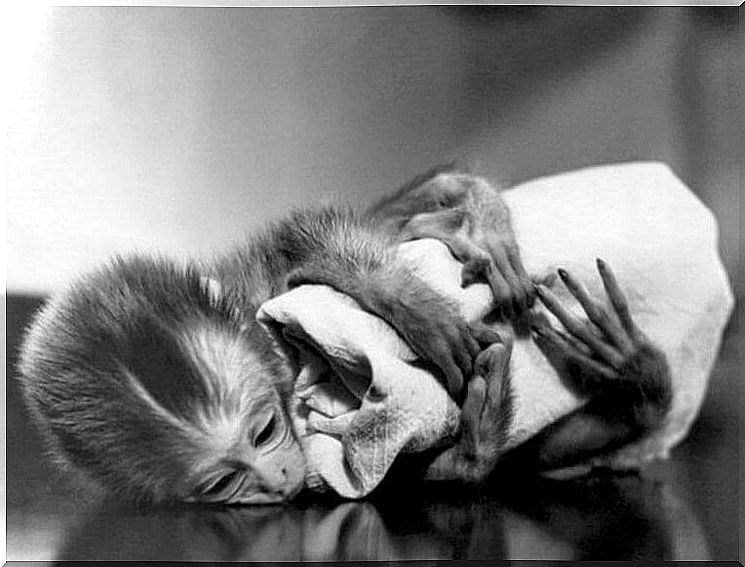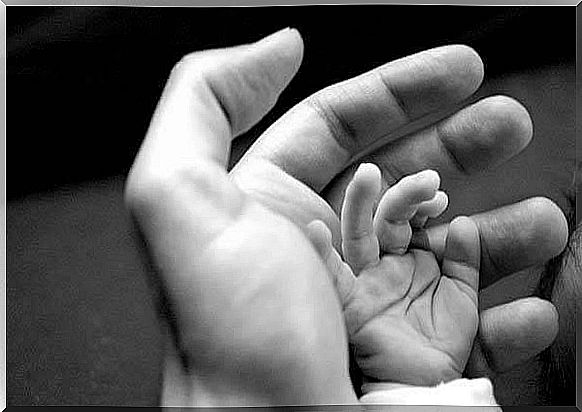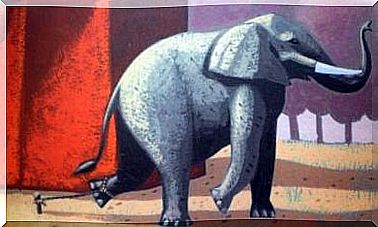The Harlow Experiment And Attachment Theory

Attachment theory is based on the psychological phenomena that occur when we establish emotional bonds with others. How we do this is conditioned by how our parents related to us in childhood. This is why on many occasions toxic relationships or relationships are created that result in emotional dependence.
Bowlby was the forerunner of attachment theory and found that maternal deprivation could seriously affect children’s emotional health. It could be so dangerous that it causes cognitive retardation and a dangerous way of relating to emotions. Harlow, a US psychologist, set out to test Bowlby’s attachment theory with an experiment that many, if not all, consider cruel.
The experiment with rhesus monkeys
For his experiment, Harlow used rhesus monkeys, an Asian species of macaque that easily adapts to life with humans. The purpose of the experiment was to study the behavior of these animals and verify Bowlby’s theory. Harlow separated the cubs from their mothers to see how they would react.
The psychologist did not limit himself only to observing the behavior of the monkeys, but adopted a very curious methodology. In the cages of the monkeys there were two objects: a full bottle that would provide nourishment to the animals and a soft toy that resembled an adult monkey. This stuffed animal did not provide any kind of sustenance for the puppies.

What would the puppies choose? This was what Harlow wanted to find out, not only to confirm Bowlby’s theory, but also to verify the reality of unconditional love. The experiment showed that the puppies preferred the soft toy even if it didn’t give them any nourishment.
This allowed Harlow to confirm the importance of the relationship, of the pups’ attachment to their mothers from an early age. Although they received no food, the baby monkeys chose the soft toy because it represented the mother to them. The bottle, on the other hand, was a simple source of food that would give them neither warmth nor affection.
The most painful attachment theory
Harlow was not satisfied with what he had discovered. He decided to go further, regardless of the welfare of the rhesus monkeys. He locked the puppies in smaller and smaller spaces where they only had to eat and drink. This way he could observe their behavior in absolute isolation.
Many monkeys remained locked in these small cages for months, some even years. Deprived of any social and sensory stimuli, the monkeys began to exhibit changes in behavior due to confinement. Macaques that remained locked up for a year ended up in a catatonic state. They were passive and indifferent to everything and everyone.
When the locked up monkeys reached adulthood, they were unable to relate to their fellows properly. They could not find a partner, they did not feel the need to have children and, at times, their passivity even made them stop eating and drinking. Many macaques died.

The female monkeys had a worse experience. Harlow realized they couldn’t get pregnant, as they showed no interest in it. For this reason, he forced them to be fertilized against their will and their interest.
Attachment is needed to generate attachment
The result was terrifying. The raped mothers completely disinterested in the puppies, ignored them, did not feed them, ultimately did not love them. Many of them even mutilated the puppies causing their death.
In addition to testing Bowlby’s attachment theory, Harlow’s macabre experiment made it clear that the needs of baby monkeys went far beyond nutrition or rest. For healthy development, monkeys preferred to prioritize the need for “warmth” over the need for food.
On the other hand, Harlow’s study also highlighted the importance of early relationships and their influence on the behavior of monkeys in adulthood. Deprivation of a social stimulus early in life led the monkeys to lose interest in relationships in later years or when they were given the opportunity to cultivate one.

The deprivation of affection in humans
Bringing these conclusions back to the reality of human beings, it appears that children who do not receive the necessary affection from infants, who are isolated, who are rejected, will have serious difficulties in developing healthy relationships. An indelible trace that will determine a lack of affection and a need to satisfy “at any price” what they did not receive in the first years of life. We are talking about emotional addiction, of course.
* Editorial note: Fortunately, nowadays the ethical requirements to be met to conduct an experiment, with people or with animals, are much more stringent and an experiment like Harlow’s today would not be conducted in any way. However, it is not even possible to go back and save these animals from suffering, but we can make sure that they are honored by not forgetting what happened.









